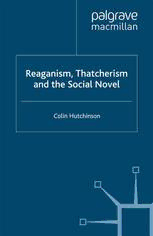
Reaganism, Thatcherism and the Social Novel PDF
Preview Reaganism, Thatcherism and the Social Novel
Reaganism, Thatcherism and the Social Novel This page intentionally left blank Reaganism, Thatcherism and the Social Novel Colin Hutchinson © Colin Hutchinson 2008 Softcover reprint of the hardcover 1st edition 2008 978-0-230-21045-5 All rights reserved. No reproduction, copy or transmission of this publication may be made without written permission. No portion of this publication may be reproduced, copied or transmitted save with written permission or in accordance with the provisions of the Copyright, Designs and Patents Act 1988, or under the terms of any licence permitting limited copying issued by the Copyright Licensing Agency, Saffron House, 6-10 Kirby Street, London EC1N 8TS. Any person who does any unauthorized act in relation to this publication may be liable to criminal prosecution and civil claims for damages. The author has asserted his right to be identified as the author of this work in accordance with the Copyright, Designs and Patents Act 1988. First published 2008 by PALGRAVE MACMILLAN Palgrave Macmillan in the UK is an imprint of Macmillan Publishers Limited, registered in England, company number 785998, of Houndmills, Basingstoke, Hampshire RG21 6XS. Palgrave Macmillan in the US is a division of St Martin's Press LLC, 175 Fifth Avenue, New York, NY 10010. Palgrave Macmillan is the global academic imprint of the above companies and has companies and representatives throughout the world. Palgrave® and Macmillan® are registered trademarks in the United States, the United Kingdom, Europe and other countries. ISBN 978-1-349-30308-3 ISBN 978-0-230-59490-6 (eBook) DOI 10.1057/9780230594906 This book is printed on paper suitable for recycling and made from fully managed and sustained forest sources. Logging, pulping and manufacturing processes are expected to conform to the environmental regulations of the country of origin. A catalogue record for this book is available from the British Library. Library of Congress Cataloging-in-Publication Data Hutchinson, Colin, 1958– Reaganism, Thatcherism, and the social novel / Colin Hutchinson. p. cm. Includes bibliographical references (p. ) and index. 1. English fiction–20th century–History and criticism. 2. Political fiction, English–History and criticism. 3. American fiction–20th century–History and criticism. 4. Political fiction, American–History and criticism. 5. Social problems in literature. 6. Right and left (Political science) in literature. 7. Thatcher, Margaret–Influence. 8. Reagan, Ronald–Influence. 9. Politics and literature–Great Britain–History–20th century. 10. Politics and literature– United States–History–20th century. I. Title. PR888.P6H87 2008 823(cid:1).9109358—dc22 2008016429 10 9 8 7 6 5 4 3 2 1 17 16 15 14 13 12 11 10 09 08 To Anne This page intentionally left blank Contents Acknowledgements viii Introduction 1 1 Reagan, Thatcher and the 1980s 15 2 Complicity and British Fiction 38 3 Liberal Guilt and American Fiction 65 4 The Communitarian Turn 90 5 Futures and Pasts 112 6 The Battlefield of the Self 136 Conclusion 168 Notes 179 Bibliography 195 Index 203 vii Acknowledgements The author and publishers wish to thank the following for permission to reproduce copyright material: Taylor & Francis Ltd. for Stan Lindsay, ‘Waco and Andover: An Application of Kenneth Burke’s Concept of Psychotic Entelechy’ Quarterly Journal of Speech (1999), 85 (3). Americana: The Journal of American Popular Culture for Alex E. Blazer, ‘Chasms of Reality, Aberrations of Identity: Defining the Postmodern Through Bret Easton Ellis’s American Psycho’ (2002), 1 (2). Pynchon Notes for Johan Callen, ‘Tubed Out and Movie Shot in Pynchon’s Vineland’ (1991), volumes 28–29; M. Keith Booker, ‘Vineland and Dystopian Fiction’ (1992), volumes 30–31; Barbara L. Pittman, ‘Genealogy, History and the Political Left in Vineland’ (1992), volumes 30–31; Philip Gochenour, ‘The History Written on the Body: Photography, History and Memory in Pynchon’s Vineland’ (1993), volumes 32–33; Eva C. Karpinski, ‘From V to Vineland: Pynchon’s Utopian Moments’ (1993), volumes 32–33; and John Johnston, ‘An American Book of the Dead: Media and the Unconscious in Vineland’ (1994), volumes 34–35. Sage Publications for Herbert Kitschelt, ‘Austrian and Swedish Social- Democrats in Crisis: Party Strategy and Organization in Corporatist Regimes’ in Comparative Political Studies (1994), 27 (1); Thomas Robbins, ‘Cults, Converts, and Charisma: the Sociology of New Religious Movements’ Current Sociology (1988), 36 (1); and Lori Kendall, ‘Nerd Nation: Images of Nerds in US Popular Culture’ International Journal of Cultural Studies (1999), 2 (2). ARIEL: A Review of International English Literature for Berthold Schoene- Harwood, ‘Dams Burst: Devolving Gender’ in Iain Banks’s The Wasp Factory (1999), 30 (1). Oxford University Press for N. Katherine Hayles, ‘Postmodern Parataxis: Embodied Texts, Weightless Information’ in American Literary History (1990), 2 (3); and Xuejun Sun, ‘Thatcher’s Man’ Cambridge Quarterly (1994), 23 (4). viii Acknowledgements ix Kudlow & Co. for Lawrence Kudlow, ‘Reaganomics, What Worked? What Didn’t?’ (1997), available at www.ronaldreagan.com/experiment.html; accessed on 16 June 2008. The Dalkey Archive Press for Jonathan Franzen, ‘I’ll Be Doing More of Same’ The Review of Contemporary Fiction (1996), 16 (1). The English Association for Paul Edwards, ‘Time, Romanticism, Modernism, and Moderation in Ian McEwan’s The Child in Time’, and Jeremy Green, ‘Millennial Hysteria in Don DeLillo’s Mao II’ in English: The Journal of the English Association (1995), volume 44; and Patricia Horton, ‘Trainspotting: A Topography of the Masculine Abject’ English (2001), volume 50. Heldref Publications for David Porush, ‘ “Purring into Transcendence”: Pynchon’s Puncutron Machine’ Critique: Studies in Contemporary Fiction (1995), 36 (4); and Jago Morrison, ‘Narration and Unease in Ian Mcewan’s Later Fiction’ Critique (2001), 42 (3). Bomb magazine for an excerpt from an interview between Jonathan Franzen and Donald Antrim (2001), issue 77.
